Navigating Hoarding Disorder Together: Support Strategies for Families
Navigating the Challenges and Emotions When Your Loved One is a Hoarder
At Bio-One of NW Indianapolis, we’re acquainted with the journey that brought you here. We understand you’ve already been trying to solve this problem alone—and we’re proud of you. It’s tough. You’ve been struggling out of concern for the hoarder, for you, for your family, for the property… and the list can go on.
Hoarding is complicated and messy. But you already know that.
After 20+ years of hoarding cleanup, we’ve made some observations and learned some lessons we’d like to share with you—because we feel they might help you and the hoarder.
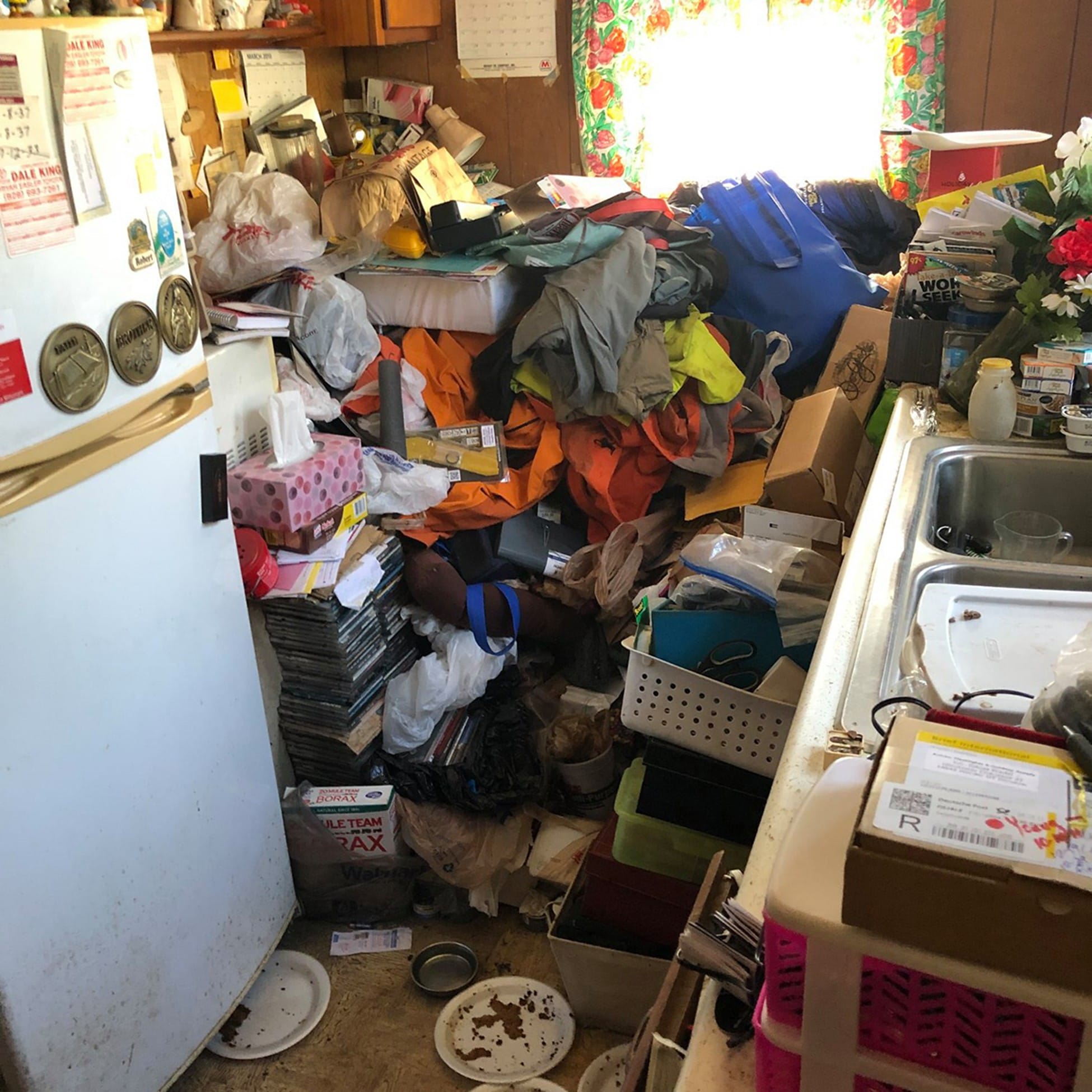
Hoarding From the Outside
On the outside looking in, you see clutter, chaos, and conditions that are unhealthy and hazardous, such as:
- Fire Risk: Accumulated clutter can increase the risk of fires.
- Tripping Hazards: Cluttered spaces raise the risk of tripping and falling.
- Structural Damage: Hoarded items can damage the building's structure.
- Health Concerns: Hoarding can lead to poor indoor air quality, attracting allergens and pests.
- Sanitation Issues: Clutter obstructs access to essential areas like kitchens and bathrooms.
- Pest Infestations: Hoarded items create ideal habitats for pests like rodents and insects.
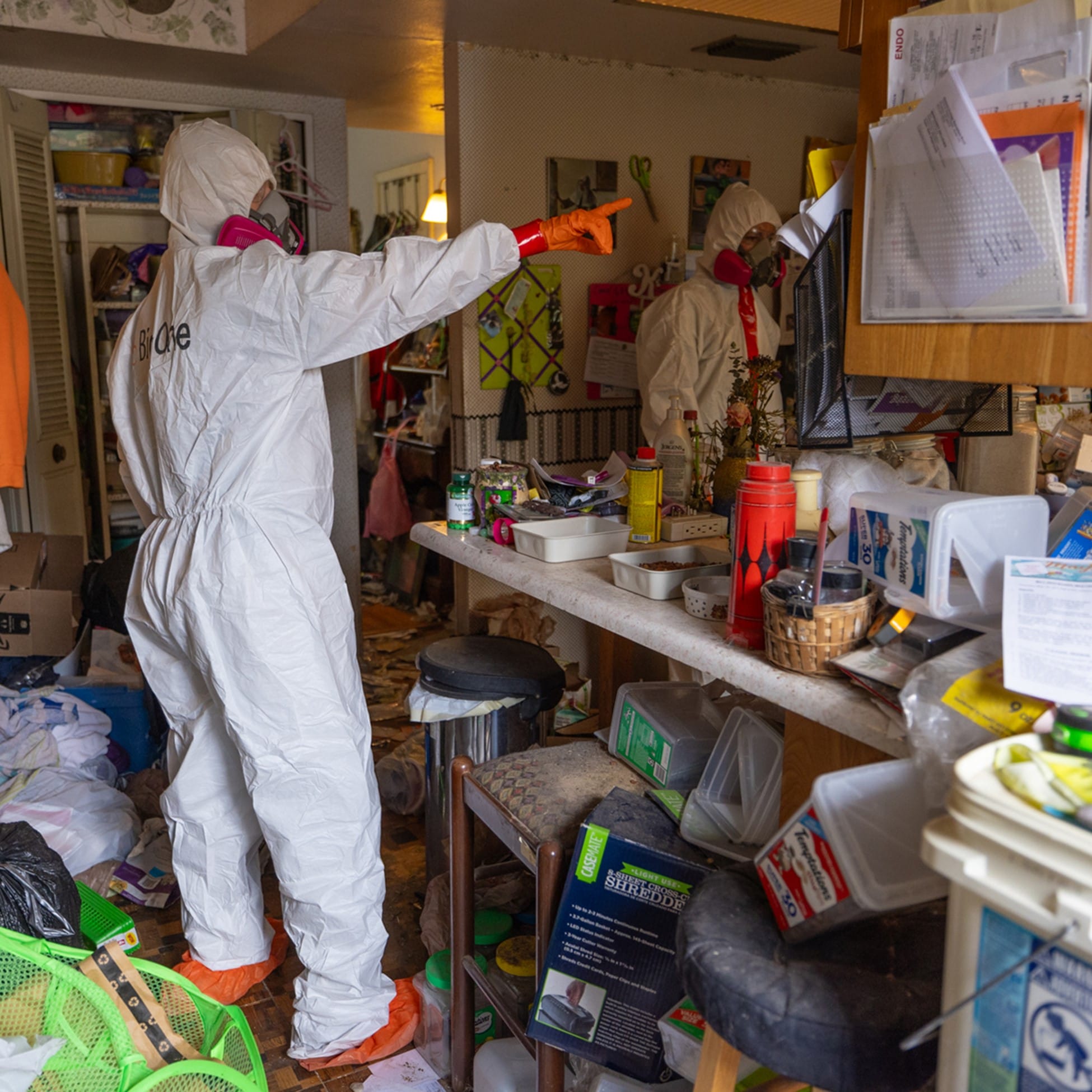
Hoarding From the Inside
On the inside, however, you see a person—a family member—struggling and probably isn’t consciously choosing to live this way.
Hoarders hoard for various complex reasons, and the exact cause can vary from person to person. Hoarding is recognized as a mental health disorder known as "hoarding disorder."
It's essential to understand that hoarding is not just a matter of being messy or disorganized; it involves deeply ingrained thoughts, behaviors, and emotions.
Some of the primary reasons why hoarders hoard include:
- Emotional Attachment: Hoarders form strong emotional bonds with possessions, seeing them as extensions of themselves.
- Fear of Waste: They fear wasting items, regardless of their value or utility.
- Perceived Utility: Hoarders believe every item might have future use or value.
- Avoidance of Distress: Hoarding is a coping mechanism to avoid negative emotions.
- Compulsive Behavior: It's often linked to compulsive acquisition and an inability to discard.
- Perfectionism: Some hoarders seek perfection through the accumulation of items.
- Lack of Organization Skills: Difficulty in organizing and decision-making leads to clutter.
- Trauma or Loss: Past trauma or significant life changes can trigger hoarding.
- Genetics and Brain Function: Genetic factors and brain differences may contribute.
- Social Isolation: Hoarding can lead to social withdrawal due to shame and embarrassment.

So, What Happened When You Tried to Help the Hoarder and Their Clutter?
When dealing with hoarding behavior, every experience of trying to help can unfold uniquely, filled with challenges and lessons.
It is not uncommon for the initial attempt to be met with resistance. Hoarding is more than just a clutter issue; it manifests deep-seated emotional, psychological, and sometimes physical struggles. Recognizing this is a crucial first step before embarking on the journey of helping a hoarder.
The journey is rarely linear. There are often setbacks where progress might seem to reverse. Stressful events or emotional lows could trigger this.
How You May Be Feeling Right Now
Not great, right?
When dealing with a hoarder and cleaning up their belongings, you might experience a range of complex and intense emotions.
Here are some common feelings and emotions you may go through:
- Frustration: You may feel exasperated by the hoarder's inability to recognize the problem or accept help. They might have attempted to clean up the clutter multiple times, only to see it return.
- Worry: Concern for the hoarder's well-being is a significant source of stress. Hoarding can lead to unsafe living conditions, health risks, and social isolation. You worry about the hoarder's physical and mental health.
- Helplessness: It's common to feel powerless in the face of hoarding. You may want to help but struggle to make meaningful progress, leading to helplessness.
- Anger: There can be moments of anger and resentment, primarily if the hoarder's behavior has caused strained relationships, financial problems, or legal issues. You might feel anger towards the hoarder or the situation itself.
- Guilt: You may experience guilt, feeling that you could have done more to prevent or address the hoarding behavior earlier. You may question whether you enabled the hoarder in some way.
- Sadness: Witnessing a loved one's struggle with hoarding can be emotionally painful. You may feel sadness for the hoarder's suffering and the impact on the family unit.
- Embarrassment and Shame: Due to hoarding, you might feel embarrassed to invite others into your home. You may also experience shame associated with the stigma often attached to hoarding disorder.
- Confusion: Understanding the psychological complexities of hoarding can be bewildering. You may need help comprehending why the hoarder behaves this way.
- Desperation: In severe cases, you may reach a point of desperation, feeling that you have exhausted all options and resources without improvement.
It's important to acknowledge that these emotions are normal when dealing with hoarding. Consider seeking therapy or support groups to help manage these feelings and learn effective strategies for assisting your loved one in addressing the hoarding disorder.
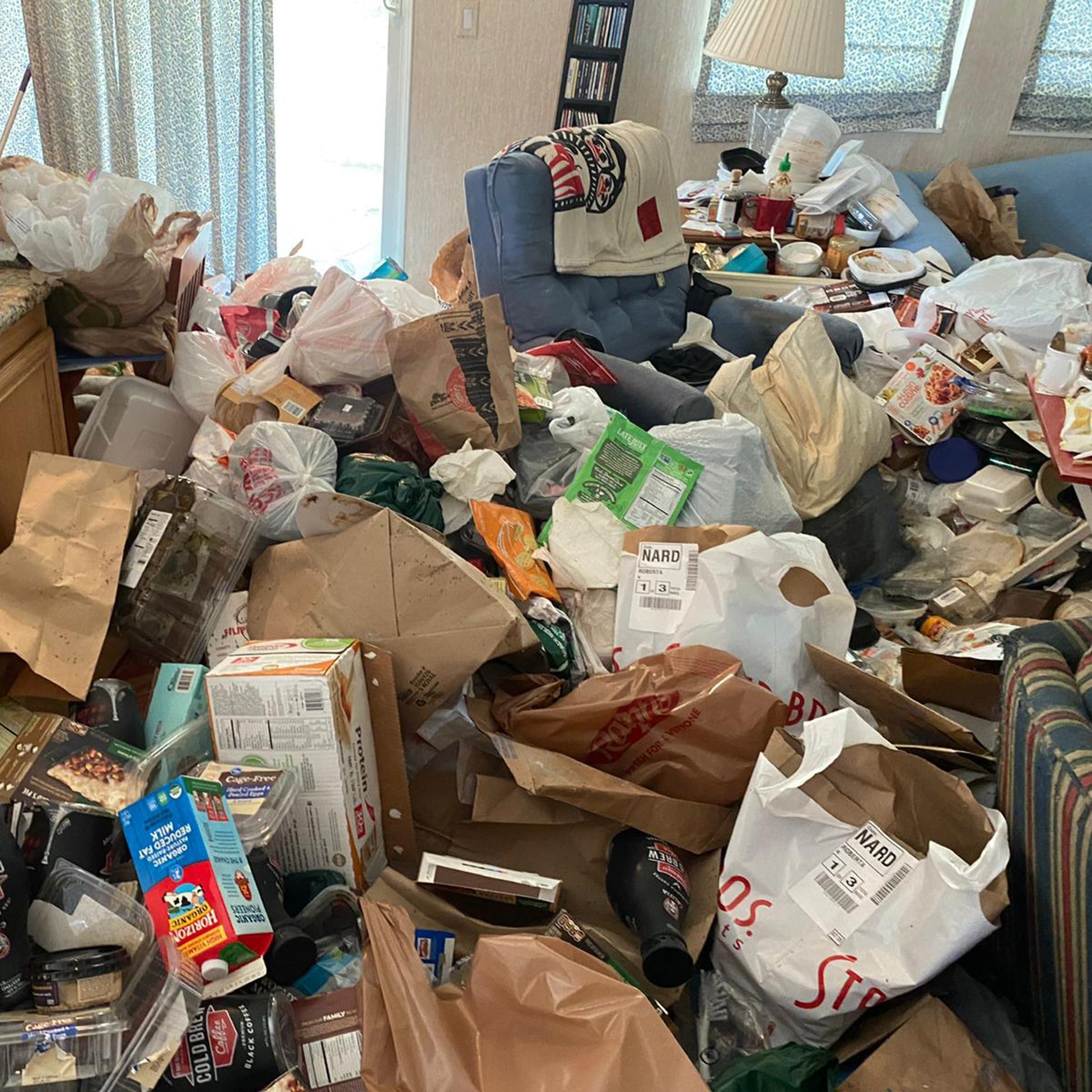
How The Hoarder May Be Feeling Right Now
When you approached the hoarder about their hoarding, the hoarder may have experienced a wide range of emotions and reactions.
These can include:
- Defensiveness: Hoarders often feel defensive when confronted about their hoarding behavior. They may perceive the intervention as criticism or an invasion of their privacy.
- Denial: Many hoarders are in a state of denial about the severity of their hoarding problem. They may downplay the clutter and insist it's not as bad as you believe.
- Anger: The hoarder may react with anger, feeling that you’re trying to control or change them. They might express frustration or irritation at the intrusion.
- Fear: Hoarders may be concerned about losing their possessions or being forced to part with items. They may fear that you will clean out their belongings without their consent.
- Shame: Hoarders often feel deep shame about their hoarding behavior. They may be ashamed that you’ve discovered the clutter and see the living conditions they've created.
- Anxiety: The prospect of decluttering and making decisions about possessions can trigger stress in hoarders. They may feel overwhelmed by the idea of change.
- Resentment: Hoarders might resent you for interfering in their life. They might believe you don't understand them or their attachment to their possessions.
- Guilt: In some cases, hoarders feel guilty about the impact of their hoarding on their family members. They may recognize that their behavior is causing distress and discord within the family.
- Isolation: Hoarders may respond by isolating themselves further. They might withdraw from family interactions to avoid discussions about their hoarding.
- Relief: In rare cases, a hoarder may feel relieved that someone is finally acknowledging their struggle. This can be a first step toward seeking help.
Appraising a hoarder with empathy, understanding, and patience is essential. Hoarding disorder is a complex mental health condition, and hoarders often need professional intervention and support to address their underlying issues.
Consider involving therapists, counselors, or hoarding cleanup specialists to facilitate productive conversations and provide guidance on the path to recovery.
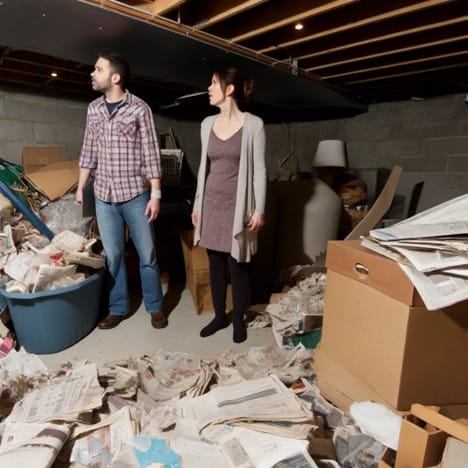
Supporting Loved Ones with Hoarding Disorder
It's essential to understand how to provide support effectively. Hoarding Disorder often leads to a refusal of help, which can be frustrating for family members. To make a difference in your loved one's life, it's crucial to comprehend why they are reluctant to accept assistance.
Understanding The Hoarder’s Refusal for Help
- Poor Insight: Many individuals with hoarding disorder need more insight into the extent of their problem. They don't see their clutter as excessive or hazardous, making them resistant to help. Their inability to recognize the issue often stems from the long-term nature of hoarding.
- Disagreement on Solutions: Sometimes, hoarders acknowledge the problem but view it differently than their families. They might think it's not as severe as others believe and may resist treatment, preferring solutions like finding more storage space, which doesn't address the root issue.
- Fear: Hoarders may refuse help because they fear discovery, eviction, or the loss of their possessions if others intervene. This fear keeps them from seeking necessary repairs or assistance with housing.
- Hopelessness: Those with severe hoarding problems may feel hopeless about change, given the daunting task of decluttering years of accumulated items. They may have tried unsuccessfully, leading to feelings of hopelessness.
- Resentment and Mistrust: Hoarding problems can strain relationships, creating resentment and mistrust. Family members may have removed items without permission, leading to a breakdown in trust.
- Personal Values: Hoarding often fulfills specific personal values for the affected individual, making it hard to let go. Possessions may confer a sense of importance or fulfill a particular role in their lives.
How to Offer Help When the Loved One is Open to Help
- Educate Yourself: Research treatment options and therapists experienced in hoarding disorder. Always involve your loved one in decisions and respect their choices.
- Medication: Discuss the potential benefits of medication to address related issues like depression or inattention. Ensure your loved one understands how these medications can help.
When the Loved One Refuses All Help
- Harm Reduction: Focus on managing harm or risk while allowing your loved one to continue hoarding to some extent. Create a plan to keep the most dangerous areas clear of clutter. This approach recognizes that complete decluttering may take time to be achievable.
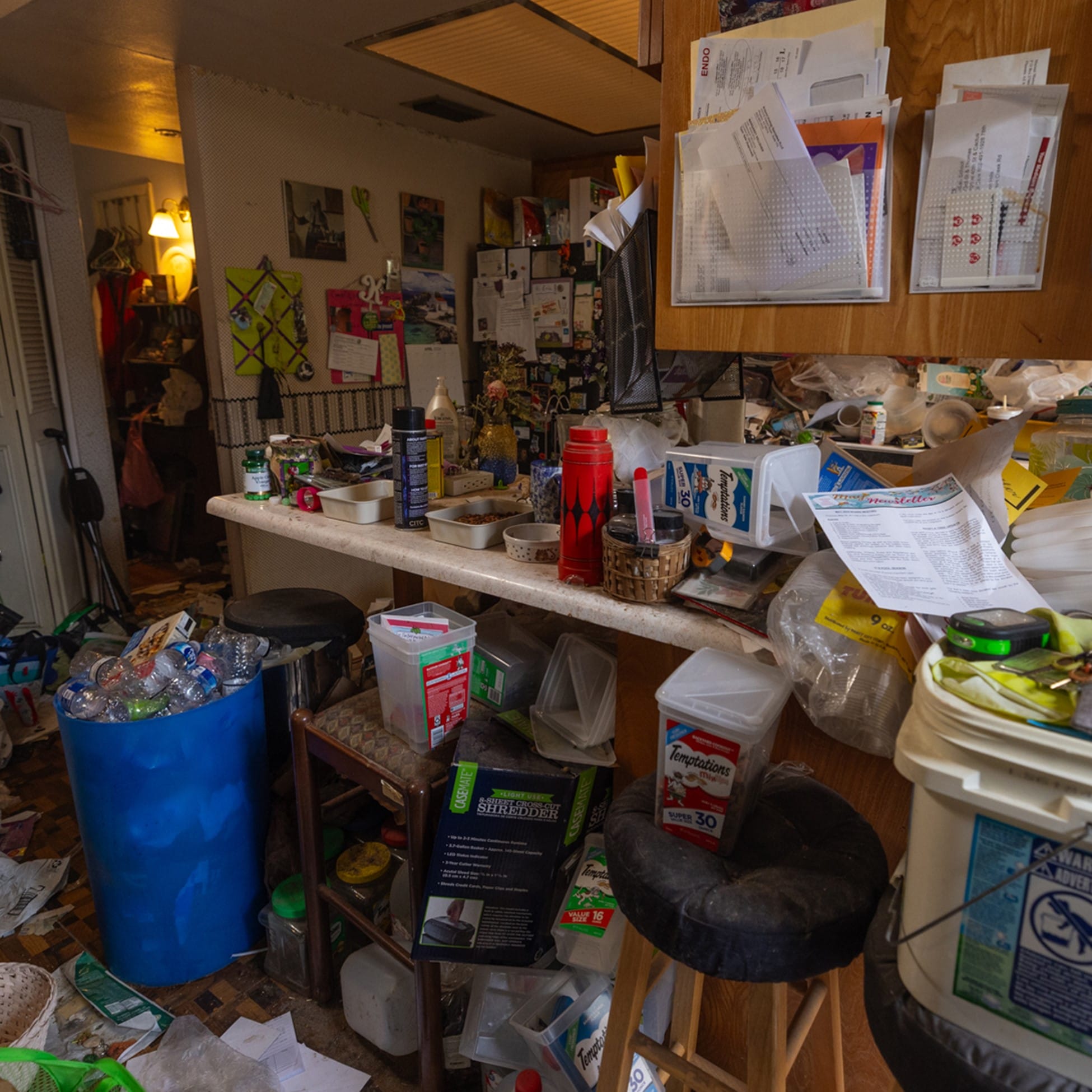
When Facing an All-Out Intervention
- Emotional Support: Clear-out interventions can be emotionally traumatic. Provide emotional support before, during, and after the process. Reconnect with your loved one and help them understand the roles of officials and support personnel.
- Partner with Authorities: When hoarding becomes a public issue, work with the authorities rather than against them. They are there to carry out the law, and a cooperative approach can make the process more compassionate.
- Grieve and Encourage Help: After a clear-out intervention, allow your loved one to grieve the loss of possessions. Then, gently encourage them to accept help through treatment or a harm reduction approach to address the underlying hoarding problem.
A Path Forward with Hope
There are no shortcuts or one-size-fits-all solutions to dealing with hoarding disorder. It's a complex issue with deep-rooted psychological factors and emotional complexities. However, as you've embarked on this journey as a concerned family member or a friend, you've already taken a significant step.
You've shown care, patience, and understanding, and that's commendable. Remember, you're not alone in this journey. There are resources, support groups, and professionals who specialize in hoarding disorder and its treatment.
At Bio-One, we've witnessed countless stories of transformation. We've seen homes go from chaos to cleanliness, and we've watched individuals recover from hoarding disorder.
The key is persistence and empathy. Understand that recovery may be slow, with ups and downs, but every small step counts. Seek professional guidance, involve therapists, and educate yourself about the condition. Your loved one needs your support more than ever.
Ultimately, remember that hoarding is not a reflection of failure but a manifestation of deeper struggles. By approaching it with compassion and determination, you can help your loved one find a path to healing and reclaim their life.
For immediate expert hoarding cleanup service, contact Bio-One of NW Indianapolis today at (317) 435-1611. Your health and peace of mind are our top priorities. Let our professional local team help you restore your environment to a safe and clean condition.
Resources for Family Members of Those That Hoard
- Click for Bio-One hoarding cleanup resources and guides.
- International OCD Foundation Website
- Family and Friends of Hoarders Support Group Facebook Page
- Children of Hoarders Website
- Ways To Help a Family Member Who Hoards Randy Frost, Ph.D. (4:28)
- Humanizing Hoarding Jennifer Hanzlick, TEDxBoulder, Entrepreneur, Speaker and Hoarding Expert (11:03)
Hoarding and Cleanup FAQ
Why should I hire skilled professionals for hoarding cleanup?
Hoarding cleanup requires specialized training to handle the complexities safely and effectively, such as removing hazardous materials and navigating challenging environments.
What makes hoarding cleanup different from regular cleaning?
Hoarding cleanup involves dealing with large volumes of items, potential hazards, and emotional challenges beyond regular cleaning.
What hazards might be present in a hoarding environment?
Potential hazards include mold, pests, structural damage, sharp objects, and hazardous chemicals.
Can hoarding cleanup be handled by family members?
While family members may assist, professionals are better equipped with the tools and knowledge to handle hoarding situations safely.
How long does it usually take to clean a hoarding mess?
The duration depends on the severity and size of the hoard, but professionals work efficiently to restore safety and cleanliness as quickly as possible.
Is the cleanup process intrusive or overwhelming for the homeowner?
Professionals aim to conduct the cleanup process respectfully and compassionately, working closely with the homeowner to make informed decisions.
How do professionals handle the disposal of hazardous materials?
Skilled teams follow strict protocols to safely identify, handle, and dispose of hazardous materials in compliance with regulations.
What kind of training do hoarding cleanup professionals have?
They often undergo specialized training in handling hazardous materials, biohazards, and cluttered environments to ensure safe and effective cleanup.
Are there any legal issues involved in hoarding cleanup?
Legal issues regarding property rights and safety regulations can arise, so it's vital to consult professionals familiar with them.
How can I support a loved one who is hoarding?
A: Approach the situation empathetically and encourage them to seek professional help to assist with the cleanup and any underlying issues.


